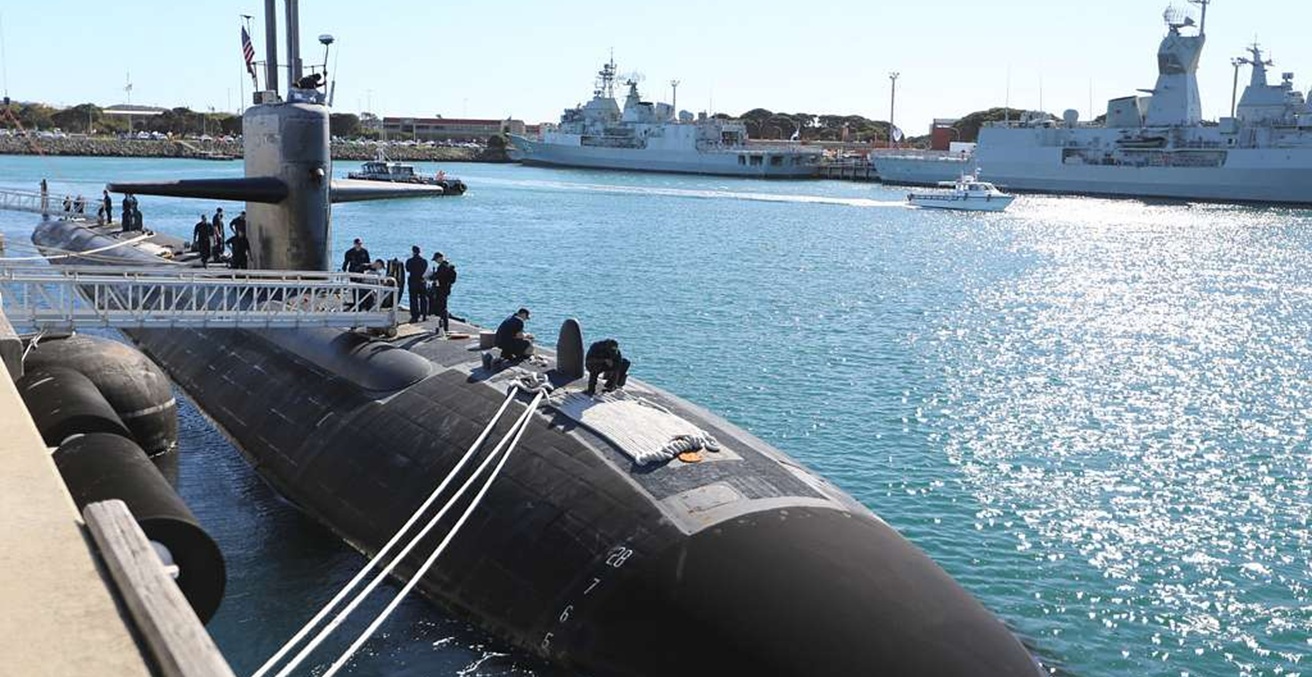The AUKUS agreement enhances military cooperation, specifically in the realm of nuclear submarine technology. This new forum also presents an opportunity for trilateral climate security collaboration.
In an early morning Australian press conference, Prime Minister Scott Morrison virtually joined British Prime Minister Boris Johnson and US President Joe Biden to announce the formation of a new cooperative military agreement: AUKUS.
While the main thrust of the AUKUS announcement was the acquisition of eight nuclear-powered submarines for the Royal Australia Navy, the agreement also signified an enhanced trilateral relationship to share and develop “cyber capabilities, artificial intelligence, quantum technologies, and additional undersea capabilities.” The initial focus on these areas will ensure that Australia has access, and can contribute, to the most sophisticated military technology on offer. Against the backdrop of a militarily emboldened and more assertive China, the new AUKUS arrangement presents a mature view of Australia as a leading stakeholder in the Indo-Pacific region.
However, this deepening of Australia’s role must also extend to the threats beyond the current horizon, such as climate change. While China’s economic and military growth pose a credible and concerning challenge for regional strategists, the security implications of climate change will have a significant destabilising effect on the current geopolitical landscape. From mass migration due to sea-level rise, to more frequent and severe weather events demanding military intervention, and the contestation over scarce food and water resources – climate change has the potential to negate the aspirational strategic benefits of the AUKUS deal. Instead, this new relationship must be clear-eyed about the reality of the climate threat and ensure it is considered as a central component of all future decisions and acquisitions.
While the parameters of the AUKUS agreement are yet to be fully understood, there are positive signs that climate change will not be left off the table. Mitigating the risks associated with climate change has been a defining component of the Biden administration’s domestic and regional security policies. In April of this year, Secretary of Defense Lloyd Austin stated that “no nation can find lasting security without addressing the climate crisis” and directed the Department of Defense (DoD) to undertake a comprehensive assessment of its preparedness to confront the threat. Subsequently, the Pentagon has commenced the task of understanding the vulnerability of all US military installations, defining a pathway to reduce greenhouse gas emissions and better predict sources of climate-fuelled instability. The findings of this intelligence risk assessment will likely be a central component of President Biden’s first National Security Strategy.
Climate change has also received important attention from the UK military sector. In March, the Ministry of Defence released the Climate Change and Sustainability Strategic Approach report in a bid to “improve how [they] meet the defence and security challenges of the future.” The document detailed three strategic goals: adapt to the changing operational environment, reduce emissions to achieve net zero by 2050, and act and be recognised as a global climate security leader. Ahead of the COP26 Summit in Glasgow later this year, the attention which the UK armed forces have afforded climate change provides a unique opportunity for broader security discussions, including within AUKUS.
Although climate change and the associated security implications are evidently issues of great concern to the US and UK, Australia remains hesitant to consider or act on this important geostrategic risk. The Australian Climate Council recently released a report titled “Rising to the Challenge: Addressing Climate and Security in Our Region” which unequivocally stated that failure to act on climate change increased regional insecurity and will result in a loss of geopolitical influence, particularly in the Pacific. This came off the back of analysis from the Australian Security Leaders Climate Group, which argued that Australia was “Missing in Action” on the issue of climate security. From a policy perspective, the 2020 Defence Strategic Update only mentioned climate change on one occasion, paying only cursory attention to what Australia’s key partners have described as the most important security challenge of this century. There is a notable and troubling gap between what Australia’s most valued security partners are doing and the domestic uptake of the issue at the political level.
The purchase of new nuclear submarines will play a pivotal role in enhancing Australian (and regional) security, but neglecting to pay significant attention to the issue of climate change will have far more serious consequences. The UK and US are taking a leadership role in both appreciating and responding to the climate security challenge, while Australia lags behind in a state of strategic ambivalence. The AUKUS arrangement offers an optimal forum for Australia’s climate security deficiencies to be remedied and a chance to leverage the lessons learned by others in this process. Though the development and release of an AUKUS Climate Security communique is an unlikely occurrence in the near term, there are lower-order initiatives which would improve the Australian Defence Force’s readiness. At the tactical level, Australia would benefit from replicating a comprehensive climate vulnerability assessment of military bases around the country, using the existing DoD framework for analysis. Information sharing of this nature has the potential to both catalyse further collaboration and enhance collective climate security.
The AUKUS deal could be the start of a meaningful, lasting climate security relationship between three world leaders. Closer to home, this may even be the impetus for stronger domestic emissions reduction targets and a pathway to build upon some of Australia’s fractured relationships in the Pacific. The AUKUS alliance has a significant amount of potential to improve Australia’s preparedness to confront the climate crises, and it is an opportunity not to be squandered.
Matthew Newman holds a Bachelor of Arts (Hons) in International Politics from the University of New South Wales Canberra and is interested in climate security. The views in this piece are his own and do not reflect any other organisation with which he is associated.
This article is published under a Creative Commons Licence and may be republished with attribution.




